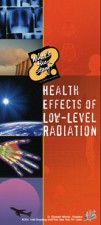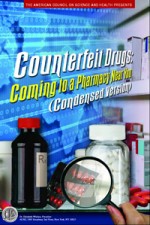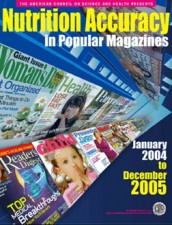This piece appeared on the site washingtontimes.com.
This week the Food and Drug Administration approved the first vaccine specifically designed to prevent cancer. Merck's Gardasil thwarts cervical cancer by blocking infection by the human papilloma virus, which is spread through sexual contact. Gardasil also blocks precancerous lesions that can cause infertility.
Search results
This article appeared in the Washington Times.
A commission of the World Trade Organization has held the European Union's 1998-2004 moratorium on planting and importing genetically-modified food and cotton was not based on science. Hooray.
A recent study appeared in the Journal of the American Medical Association, the results of which implicated coffee drinking in the causation of heart attacks.
This letter appeared on January 5, 2006 in the Pittsburgh Post-Gazette:
To the Editor:
A December 5, 2006 piece by Dan Childs on the ABC News site notes reactions to the trans fat hysteria from ACSH's Dr. Gilbert Ross and recently-deceased ACSH Advisor Dr. David Kritchevsky:
The American Council on Science and Health also questioned the decision.
A November 22, 2006 piece by S. Fred Singer in the Financial Post notes the author's ACSH Advisor status and his impatience with the misuse of science, even in a good cause:
Impoverished Africans should be grateful to philanthropist Lance Laifer for his effective outreach to reduce the tragic, needless toll of malaria in sub-Saharan Africa ("Malaria's Toll" by Jason Riley, editorial page, Aug. 21). For his attempt to focus complacent Americans, Mr. Riley also deserves thanks -- such clarity is obviously desperately needed, as even with all the publicity accorded to the ravages of malaria, someone as educated and intelligent as Mr. Laifer remained blithely unaware of this scourge until last year.
A December 8, 2006 column by Jay Ambrose compares cancer fears over cell phones to other bogus health scares of the past, citing ACSH and ACSH Trustee Dr. Henry Miller:
Remember the Alar scare? You have to go back to 1989 for that one. It was alleged on a 60 Minutes show that this chemical used in apples would cause childhood cancer, which in fact it would not. The truth emerged and the scare died out in time, but not until the apple industry had suffered a pointless, stupid $375 million setback.
The past twelve months produced a bumper crop of health scares, according to physicians and scientists with the American Council on Science and Health (ACSH). In a new roundup, ACSH describes the genesis of 10 of the most outrageous ones, and explains why they are scares with little or no basis in scientific fact.
“Food and nutrition are always prime targets for outlandish pronouncements,” stated Dr. Ruth Kava, ACSH nutrition director. This year the false food-related scares included:
 The possibility of suffering adverse health effects as a result of exposure to radiation is a cause of concern and fear for many people.
The possibility of suffering adverse health effects as a result of exposure to radiation is a cause of concern and fear for many people.
A December 20, 2006 year-end highlights column by Arizona's Becky Fenger echoes a choice by ACSH's Dr. Elizabeth Whelan:
Dumbest Idea by a State: New Jersey hit the jackpot in this tightly competitive category by slapping a tax on exercising! That's right. The Garden State levied a 7% tax on health club memberships. "Just when we should be giving people incentives to work out, New Jersey is penalizing consumers for doing so. What's next, a tax on diet soda?" asks Dr. Elizabeth M. Whelan, president of the American Council on Science and Health.
A November 4, 2006 piece from Canada's Globe and Mail by Gina Mallet (like numerous publications in the U.S.) contrasts the hysteria over trans fats with ACSH's position:
A September 18, 2006 editorial from Investor's Business Daily applauds the World Health Organization's recent embrace of the pesticide DDT as a malaria-fighter, citing ACSH:
According to Dr. Elizabeth Whelan, president of the American Council on Science and Health, during its less than 30 years of use (1944-72), DDT prevented more human death and disease than any other man-made chemical in all of recorded history.
Unscientific scares demand unscientific polls, so we asked people to click here to vote on whether to ban trans fats.
After readers weighed in, the results were 68% (28 votes) to 27% (11 votes), with 5% (2 votes) undecided, AGAINST banning trans fats. Would that NYC's Department of Health were as wise a deliberative body as our readers. And would that people would avoid taking polls seriously if they don't involve large, randomized samples.
This article originally appeared in the New York Sun.
There is no scientific evidence linking exposure to 9/11 dust and diseases such as pulmonary fibrosis. That doesn't stop the press and politicians from leaping to conclusions.
Take the case of New York Police Officer Cesar Borja, the police officer whose son was a guest of Senator Clinton at the State of the Union only hours after his father's untimely and premature death from lung disease.
This piece originally appeared in the New York Sun.
Public-health "advocates" have to rally popular sentiment and political support to make progress on the long list of foods and consumer products that they want to see banned because of purported health hazards. They issue regular press releases about "toxins," "poisons," and "carcinogens" and then frequently follow up with calls for regulatory action.
A May 29, 2007 piece by the Reason Foundation's Ted Balaker cites ACSH:
This piece first appeared on July 25, 2007 on TCSDaily.com.
In his new documentary Sicko, which calls for nationalized health care, Michael Moore shows a montage of ads urging the viewer to "ask your doctor" about various medications, implying the ads are responsible for over-medicating society. Lucky for patients, not everyone in Congress agrees with him. At least not yet.
 New York, NY -- May 1, 2007. The public health establishment has misled smokers about the benefits and risks of using smokeless tobacco as a method of quitting cigarettes.
New York, NY -- May 1, 2007. The public health establishment has misled smokers about the benefits and risks of using smokeless tobacco as a method of quitting cigarettes.
A January 10, 2007 column by George Mason University economics professor Walter Williams, appearing in Human Events, in Deseret News, and on PittsburghLive.com, mentions the reaction of ACSH's Dr. Elizabeth Whelan to the trans fat hysteria:
A February 1, 2007 piece by Heartland Institute's Sandra Fabry notes the reaction of ACSH's Dr. Elizabeth Whelan to measures such as "fat taxes":
While acknowledging there is a measurable major increase in Americans being overweight, Dr. Elizabeth Whelan, president of the American Council on Science and Health, thinks taxing certain food groups is the wrong answer to the obesity problem.
Pagination
ACSH relies on donors like you. If you enjoy our work, please contribute.
Make your tax-deductible gift today!




